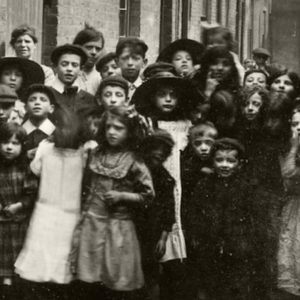Sometimes reading a book creates a feeling of ‘recollection’. Something about the atmosphere, the use of certain words, the depiction of daily life, seems so familiar, almost as if we have actually been there, in a different time and place. When I read Israel Zangwill’s Children of the Ghetto: a Study of a Peculiar People, I felt this way. In a way, the spirit of my parents, who immigrated to Israel from Eastern Europe, was similar to the state of mind depicted in the novel. Alongside their intellectual engagement, they also had these inclinations to be down-to-earth, to cling to common sense, to cope with hardship through humor. I find Zangwill’s portrayal of the Jewish mentality prevalent in East London in the late nineteenth and early twentieth centuries astonishingly familiar.
Israel Zangwill (1864-1926), the “Dickens of the Ghetto” as he is sometimes called, a British writer and humorist, was born in London to Jewish immigrants from eastern Europe. He went to school in East London, where education was free, and later became a teacher, journalist, author and political activist. He married Edith Ayrton, a non-Jewish author and feminist, and openly encouraged the feminist struggle. Zangwill was also involved in the Zionism movement, supporting the foundation of a Jewish state, though not necessarily where Israel is today.
In his literary work he describes the life of Jewish immigrants, both in London and in the United States. Children of the Ghetto: a Study of a Peculiar People is a wonderful, rich, deep and humoristic description of the Jewish immigrant community in East London. The colors and spices of the ‘exile’, the Diaspora, are all there: the Yiddish language, the abstemiousness born of poverty, the inbuilt skepticism, shabby appearance, and above all, humor, which alleviates any suffering. But Zangwill also adds some observations on the nature of the Jewish people, a ‘peculiar people’, as he puts it.
“People who have been living in a Ghetto for a couple of centuries are not able to step outside merely because the gates are thrown down, nor to efface the brands on their souls by putting off the yellow badges. The isolation imposed from without will have come to seem the law of their being.” Centuries of forced isolation from the non-Jewish environment created an inner seclusion. Of course, in London Jews could live wherever they wanted. But they had already internalized a sense of being essentially different from others, though not in a negative manner: “For the Jew has rarely been embittered by persecution. He knows that he is in Goluth, in exile, and that the days of the Messiah are not yet, and he looks upon the persecutor merely as the stupid instrument of an all-wise Providence.”
Life in the Ghetto was anything but pomp. The synagogue provoked no sense of intimidating awe: “Decorum was not a feature of synagogue worship in those days, nor was the Almighty yet conceived as the holder of formal receptions once a week. Worshippers did not pray with bated breath, as if afraid that the deity would overhear them. They were at ease in Zion.” Yet this lack of distance from the divine – people often talked business in the back seats of the synagogue – went hand in hand with an affinity with ‘the Almighty’, a sense that Providence is concrete and tangible.
Perhaps the most palpable feature of Jewish life Zangwill depicts is the granting of immense importance to satisfying life’s simplest needs. Not that emotional and spiritual inclinations did not matter; they did, but always after food and shelter were ensured. When describing the signing of an engagement contract, Zangwill writes “As a nation, Israel is practical and free from cant. Romance and moonshine are beautiful things, but behind the glittering veil are always the stern realities of things and the weaknesses of human nature. The bridegroom, Pesach, … was a boot-maker, who could expound the Talmud and play the fiddle, but was unable to earn a living. He was marrying Fanny Belcovitch because his parents-in-law would give him free board and lodging for a year, and because he liked her. Fanny was a plump, pulpy girl, not in the prime of youth…. and had pain in her chest before she fell in love with Pesach Weingott.” Fanny’s father, in his Sabbath clothes (which, “like the Sabbath they honored, were of immemorial antiquity”), made sure that the engagement contract would be fair to his daughter.
The collective self-perception is a central part of the novel. Characters often see their conduct and choices as deriving from their being Jewish. The Rabbi tells his daughter “Be a good girl, dear, and bear your trouble like a true Jewish maiden. Have faith in God, my child. He doeth all things for the best.” It is the deepest framework of looking at the world; not only a natural outcome of being part of ‘a peculiar people’, but a conscious appreciation of the almost encompassing place of Judaism in one’s life.
My father used to quote an old Jewish proverb: a Jew must never ever be stupid; but if he wants to, it’s fine.

Leave a Reply